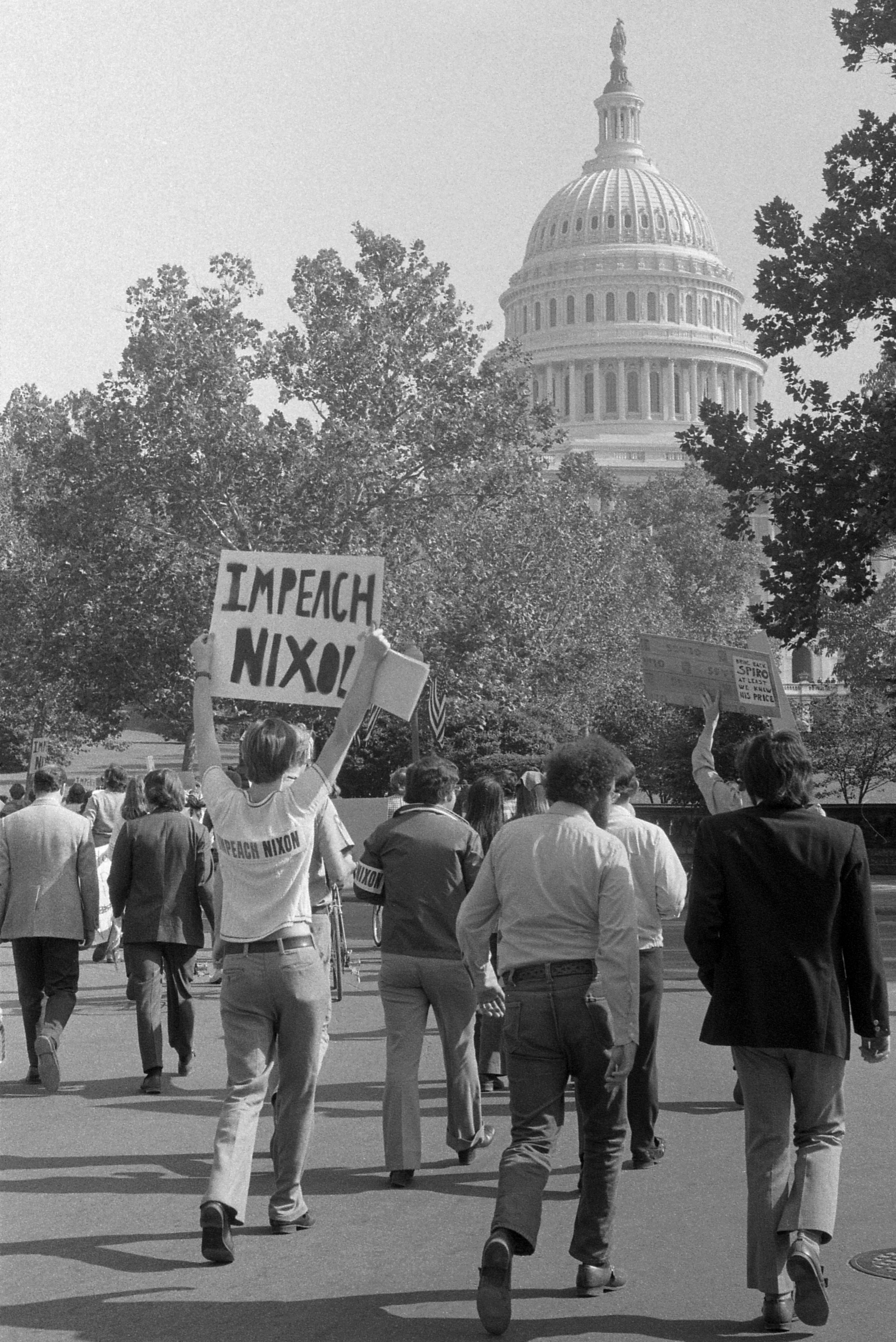|
Watergate
The Watergate scandal was a major political scandal in the United States involving the administration of President Richard Nixon from 1972 to 1974 that led to Nixon's resignation. The scandal stemmed from the Nixon administration's continual attempts to cover up its involvement in the June 17, 1972, break-in of the Democratic National Committee headquarters at the Washington, D.C., Watergate Office Building. After the five perpetrators were arrested, the press and the Justice Department connected the cash found on them at the time to the Committee for the Re-Election of the President. Further investigations, along with revelations during subsequent trials of the burglars, led the House of Representatives to grant the U.S. House Judiciary Committee additional investigative authority—to probe into "certain matters within its jurisdiction", and led the Senate to create the U.S. Senate Watergate Committee, which held hearings. Witnesses testified that Nixon had approved pla ... [...More Info...] [...Related Items...] OR: [Wikipedia] [Google] [Baidu] |
Watergate Office Building
The Watergate complex is a group of six buildings in the Foggy Bottom neighborhood of Washington, D.C., in the United States. Covering a total of 10 acres (4 ha) just north of the John F. Kennedy Center for the Performing Arts, the buildings include: * Watergate West (2700 Virginia Avenue NW), cooperative apartments. * Watergate 600 (600 New Hampshire Ave NW), office building. * Watergate Hotel (2650 Virginia Avenue NW). * Watergate East (2500 Virginia Avenue NW), cooperative apartments. * Watergate South (700 New Hampshire Avenue NW), cooperative apartments. * Watergate Office Building (2600 Virginia Ave NW), the office building where the Watergate burglary happened. Built between 1963 and 1971, the Watergate was considered one of Washington's most desirable living spaces, popular with members of Congress and political appointees of the executive branch. The complex has been sold several times since the 1980s. During the 1990s, it was subdivided and its component buildings and ... [...More Info...] [...Related Items...] OR: [Wikipedia] [Google] [Baidu] |
Impeachment Process Against Nixon
The impeachment process against Richard Nixon began in the United States House of Representatives on October 30, 1973, following the series of high-level resignations and firings widely called the "Saturday Night Massacre" during the course of the Watergate scandal. The United States House Committee on the Judiciary, House Committee on the Judiciary set up an Impeachment inquiry in the United States, impeachment inquiry staff and began investigations into possible Federal impeachment in the United States, impeachable offenses by Richard Nixon, the 37th president of the United States. The process was formally initiated on February 6, 1974, when the House granted the Judiciary Committee authority to investigate whether sufficient grounds existed to impeach Nixon of high crimes and misdemeanors#United States, high crimes and misdemeanors under Article Two of the United States Constitution#Section 4: Impeachment, Article II, Section 4, of the Constitution of the United States, Unit ... [...More Info...] [...Related Items...] OR: [Wikipedia] [Google] [Baidu] |
Nixon's Administration
Richard Nixon's tenure as the 37th president of the United States began with his first inauguration on January 20, 1969, and ended when he resigned on August 9, 1974, in the face of almost certain impeachment because of the Watergate Scandal and resigned, the only U.S. president ever to do so. He was succeeded by Gerald Ford, whom he had appointed vice president after Spiro Agnew became embroiled in a separate corruption scandal and was forced to resign. Nixon, a prominent member of the Republican Party from California who previously served as vice president under Dwight D. Eisenhower, took office following the 1968 presidential election, in which he defeated Hubert Humphrey, the then-incumbent vice president. Although he had built his reputation as a very active Republican campaigner, Nixon downplayed partisanship in his 1972 landslide reelection. Nixon's primary focus while in office was on foreign affairs. He focused on détente with the People's Republic of Ch ... [...More Info...] [...Related Items...] OR: [Wikipedia] [Google] [Baidu] |
Richard Nixon
Richard Milhous Nixon (January 9, 1913April 22, 1994) was the 37th president of the United States, serving from 1969 to 1974. A member of the Republican Party, he previously served as a representative and senator from California and was the 36th vice president from 1953 to 1961 under President Dwight D. Eisenhower. His five years in the White House saw reduction of U.S. involvement in the Vietnam War, détente with the Soviet Union and China, the first manned Moon landings, and the establishment of the Environmental Protection Agency and Occupational Safety and Health Administration. Nixon's second term ended early, when he became the only president to resign from office, as a result of the Watergate scandal. Nixon was born into a poor family of Quakers in a small town in Southern California. He graduated from Duke Law School in 1937, practiced law in California, then moved with his wife Pat to Washington in 1942 to work for the federal government. After activ ... [...More Info...] [...Related Items...] OR: [Wikipedia] [Google] [Baidu] |
List Of Scandals With "-gate" Suffix
This is a list of scandals or controversies whose names include a ''-gate'' suffix, by analogy with the Watergate scandal, as well as other incidents to which the suffix has (often facetiously) been applied. This list also includes controversies that are widely referred to with a ''-gate'' suffix, but may be referred to by another more common name (such as the New Orleans Saints bounty scandal, known as "Bountygate"). Use of the ''-gate'' suffix has spread beyond American English to many other countries and languages. Etymology, usage, and history of ''-gate'' The suffix '' -gate'' derives from the Watergate scandal of the United States in the early 1970s, which resulted in the resignation of US President Richard Nixon. The scandal was named after the Watergate complex in Washington, D.C., where the burglary giving rise to the scandal took place; the complex itself was named after the "Water Gate" area where symphony orchestra concerts were staged on the Potomac River betwee ... [...More Info...] [...Related Items...] OR: [Wikipedia] [Google] [Baidu] |
Nixon White House Tapes
The Nixon White House tapes are audio recordings of conversations between U.S. President Richard Nixon and Nixon administration officials, Nixon family members, and White House staff, produced between 1971 and 1973. In February 1971, a sound-activated taping system was installed in the Oval Office, including in Nixon's Wilson desk, using Sony TC-800B open-reel tape recorders to capture audio transmitted by telephone taps and concealed microphones. The system was expanded to include other rooms within the White House and Camp David. The system was turned off on July 18, 1973, two days after it became public knowledge as a result of the U.S. Senate Watergate Committee hearings. Nixon was not the first president to record his White House conversations; President Franklin D. Roosevelt recorded Oval Office press conferences for a short period in 1940. The tapes' existence came to light during the Watergate scandal of 1973 and 1974, when the system was mentioned during the televis ... [...More Info...] [...Related Items...] OR: [Wikipedia] [Google] [Baidu] |
Sam Ervin
Samuel James Ervin Jr. (September 27, 1896April 23, 1985) was an American politician. A Democrat, he served as a U.S. Senator from North Carolina from 1954 to 1974. A native of Morganton, he liked to call himself a "country lawyer", and often told humorous stories in his Southern drawl. During his Senate career, Ervin was a staunch defender of the Jim Crow laws and racial segregation, as the South's constitutional expert during the congressional debates on civil rights. Unexpectedly, he became a liberal hero for his support of civil liberties. He is remembered for his work in the investigation committees that brought down Senator Joseph McCarthy in 1954 and especially for his investigation of the Watergate scandal in 1972 that led to the resignation of Richard Nixon. Early life Ervin was born in Morganton, North Carolina, the son of Laura Theresa (Powe) and Samuel James Ervin. He served in the U.S. Army in combat in France during World War I with the First Division at Can ... [...More Info...] [...Related Items...] OR: [Wikipedia] [Google] [Baidu] |
Political Scandal In The United States
This article provides a list of political scandals that involve officials from the government of the United States, sorted from oldest to most recent. Scope and organization of political scandals This article is organized by presidential terms in order, older to recent, and then divided into scandals of the federal Executive, Legislative, and Judicial branches of government. Members of both parties are listed under the term of the president in office at the time the scandal took place, even though they may not be connected with the presiding president. In this article, the term "politician" (a person who is professionally involved in politics) includes not only those elected, but also party officials, candidates for office, their staffs and appointees. Please note that every president directly selects, appoints or hires several thousand people. Each of them selects thousands more. Private citizens should only be mentioned when they are closely linked to the scandal or politician ... [...More Info...] [...Related Items...] OR: [Wikipedia] [Google] [Baidu] |
Nixon's Resignation
President Richard Nixon made an address to the American public from the Oval Office on August 8, 1974, to announce his resignation from the presidency due to the Watergate scandal. Nixon's resignation was the culmination of what he referred to in his speech as the "long and difficult period of Watergate", a 1970s federal political scandal stemming from the break-in of the Democratic National Committee (DNC) headquarters at the Watergate Office Building by five men during the 1972 presidential election and the Nixon administration's subsequent attempts to cover up its involvement in the crime. Nixon ultimately lost much of his popular and political support as a result of Watergate. At the time of his resignation the next day, Nixon faced almost certain impeachment and removal from office. According to his address, Nixon said he was resigning because "I have concluded that because of the Watergate matter I might not have the support of the Congress that I would consider necessa ... [...More Info...] [...Related Items...] OR: [Wikipedia] [Google] [Baidu] |
Committee For The Re-Election Of The President
The Committee for the Re-election of the President (also known as the Committee to Re-elect the President), abbreviated CRP, but often mocked by the acronym CREEP, was, officially, a fundraising organization of United States President Richard Nixon's 1972 re-election campaign during the Watergate scandal. In addition to fundraising, the organization also engaged in political sabotage against Nixon's opponents, the various Democratic politicians running in the election. History Planning began in late 1970 and an office opened in the spring of 1971. Besides its re-election activities, CRP employed money laundering and slush funds, and was involved in the Watergate scandal. The CRP used $500,000 in funds raised to re-elect President Nixon to pay legal expenses for the five Watergate burglars. This act helped turn the burglary into an explosive political scandal. The burglars, as well as G. Gordon Liddy, E. Howard Hunt, John N. Mitchell, and other Nixon administration figures ( ... [...More Info...] [...Related Items...] OR: [Wikipedia] [Google] [Baidu] |
Alexander Haig
Alexander Meigs Haig Jr. (; December 2, 1924February 20, 2010) was United States Secretary of State under President Ronald Reagan and White House Chief of Staff under Presidents Richard Nixon and Gerald Ford. Prior to and in between these cabinet-level positions, he was a general in the United States Army, serving first as the vice chief of staff of the Army and then as Supreme Allied Commander Europe. In 1973, Haig became the youngest four-star general in the U.S. Army's history. Born in Bala Cynwyd, Pennsylvania, Haig served in the Korean War after graduating from the United States Military Academy. In the Korean War, he served as an aide to General Alonzo Patrick Fox and General Edward Almond. After the war, he served as an aide to Secretary of Defense Robert McNamara. During the Vietnam War, Haig commanded a battalion and later a brigade of the 1st Infantry Division. For his service, Haig was a recipient of the Distinguished Service Cross, the Silver Star with ... [...More Info...] [...Related Items...] OR: [Wikipedia] [Google] [Baidu] |
Central Intelligence Agency
The Central Intelligence Agency (CIA ), known informally as the Agency and historically as the Company, is a civilian foreign intelligence service of the federal government of the United States, officially tasked with gathering, processing, and analyzing national security information from around the world, primarily through the use of human intelligence (HUMINT) and performing covert actions. As a principal member of the United States Intelligence Community (IC), the CIA reports to the Director of National Intelligence and is primarily focused on providing intelligence for the President and Cabinet of the United States. President Harry S. Truman had created the Central Intelligence Group under the direction of a Director of Central Intelligence by presidential directive on January 22, 1946, and this group was transformed into the Central Intelligence Agency by implementation of the National Security Act of 1947. Unlike the Federal Bureau of Investigation (FBI), whi ... [...More Info...] [...Related Items...] OR: [Wikipedia] [Google] [Baidu] |





